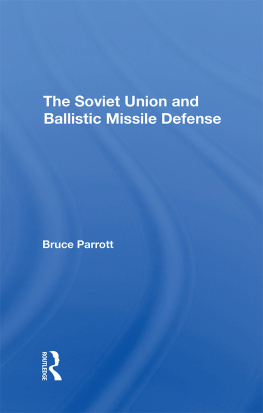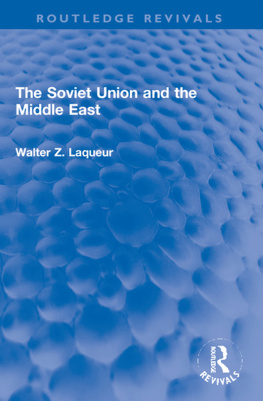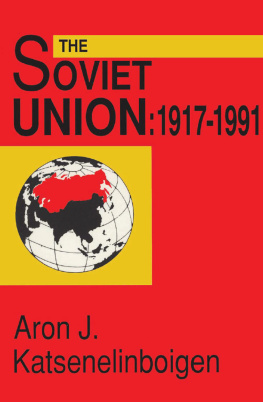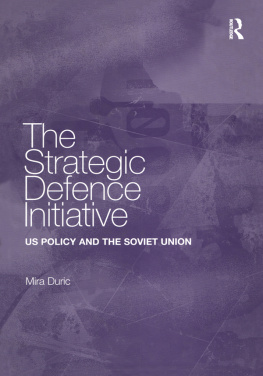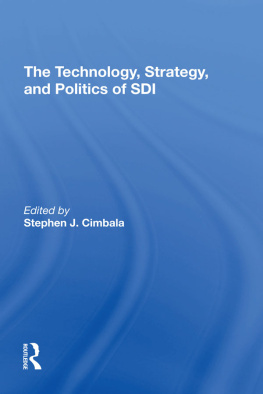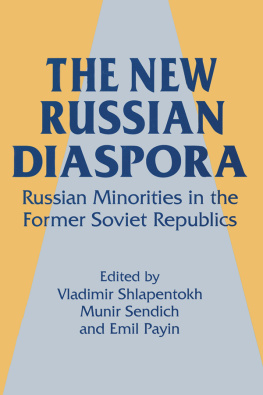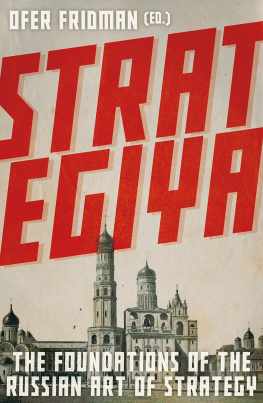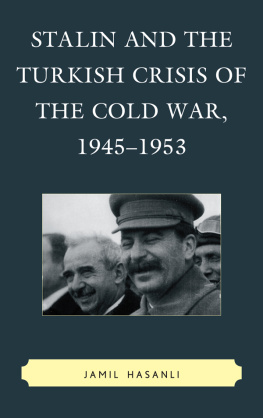The Russian View of U.S. Strategy
The Russian View of U.S. Strategy
Its Past, Its Future
Jonathan Samuel Lockwood Bl Kathleen O'Brien Lockwood
First published 1993 by Transaction Publishers
Published 2017 by Routledge
2 Park Square, Milton Park, Abingdon, Oxon OX14 4RN
711 Third Avenue, New York, NY 10017, USA
Routledge is an imprint of the Taylor & Francis Group, an informa business
Copyright 1993 by Taylor & Francis.
All rights reserved. No part of this book may be reprinted or reproduced or utilised in any form or by any electronic, mechanical, or other means, now known or hereafter invented, including photocopying and recording, or in any information storage or retrieval system, without permission in writing from the publishers.
Notice:
Product or corporate names may be trademarks or registered trademarks, and are used only for identification and explanation without intent to infringe.
Library of Congress Catalog Number: 92-11344
Library of Congress Cataloging-in-Publication Data
Lockwood, Jonathan Samuel, 1955-
The Russian view of U.S. strategy : its past, its future / Jonathan Samuel Lockwood, Kathleen OBrien Lockwood.
p. cm.
Rev. ed. of: The Soviet view of U.S. strategic doctrine. cl983.
Includes bibliographical references and index.
ISBN 1-56000-031-7 (cloth); 0-7658-0636-3 (paper)
1. Military doctrineUnited StatesHistory20th century. 2. United StatesMlitary policy. 3. Nuclear weaponsUnited StatesHistory20th century. 4. Mlitary doctrineSoviet UnionHistory20th century. 5. Soviet UnionMilitary policy. I. Lockwood, Kathleen OBrien. II. Lockwood, Jonathan Samuel, 1955- Sovietview of U.S. strategic doctrine. III. Title. IV. Title: Russian view of US strategy. V. Title: Russian view of United States strategy.
UA23.L63 1992 92-11344
355.0217 0973dc20
CIP
ISBN 13: 978-0-7658-0636-9 (pbk)
ISBN 13: 978-1-56000-031-0 (hbk)
The views and opinions expressed herein are those of the authors, and do not reflect the official position or policy of the Department of Defense or the U.S. government.
This book is dedicated to the memory of David Henry Feick (19581991), my best friend since childhood His life was short but fullContents
For this expanded, second edition, there are a number of people to whom I wish to express my thanks and gratitude. First of all, my sincere thanks to Dr. Leon Goure, Dr. William F. Scott and Harriet Fast Scott for their contributions to this volume. As my dissertation committee chairman, Dr. Goure first stimulated my interest in this field and has shown his interest in my research and career ever since. The Scotts also lent me a considerable amount of material from their personal library to help expedite my research, as well as provided encouragement and insightful comments.
I also wish to thank Dr. Roy Godson of the Consortium for the Study of Intelligence for inviting me to present my research proposal at a seminar at Bowdoin College, Brunswick, Maine in August 1991. This seminar, which encouraged young as well as experienced scholars to explore the field of intelligence studies as an academic discipline, was immensely helpful to me. Of particular value were the comments of Col. David Glantz, Director of the Foreign Military Studies Office at Fort Leavenworth; Tom Diaz, Senior Research Fellow at the National Strategy Information Center; and Dr. H. Bradford Westerfield, Damon Wells Professor of International Studies at Yale University.
Jonathan Samuel Lockwood.
In my 1983 book, The Soviet View of U.S. Strategic Doctrine: Implications for Decisionmaking, I had argued that the available evidence of Soviet perceptions of U.S. strategic doctrine indicated that the Soviets most feared a mirror-image of their own strategic doctrine. The U.S. lacked a credible strategic defense (and still does). The Soviets believed their own strategic offensive nuclear forces provided them with significant political leverage over U.S. doctrine and foreign policy. Accordingly, anything that neutralized the military effectiveness of their offensive strategic missiles would be the most powerful, effective, and credible political deterrent from the Soviet perspective. I had therefore recommended the deployment of a three-tiered strategic defense comprised of civil defense, ground-based surface-to-air missile (SAM) and antiballistic missile (ABM) defense, in addition to space-based defense. Although President Ronald Reagans declaration of the Strategic Defense Initiative (SDI) in March of 1983 emphasized a space-based rather than a three-tiered defense, the effect on the Soviet perception was predictably dramatic and in ways not generally understood in the West.
Not so predictable was the virtual collapse of the Soviet-led Warsaw Pact alliance in 1990, accompanied by the overthrow of Communist regimes throughout Eastern Europe. As of this writing, the former Soviet Union has been wracked by internal dissension and impending economic collapse, its Marxist-Leninist ideology is bankrupt and repudiated publicly by Mikhail Gorbachev, its empire is gone, and its republics have spun away from the authority of the central government with centrifugal force; its economic capacity to support its massive military infrastructure had been outrun by the grandiose ambitions of Soviet military leadership prior to Gorbachevs ascension to power. With the new formation of a Commonwealth of Independent States by Russian republic President Boris Yeltsin incorporating most of the former Soviet republics, one might be tempted to think that the millennium had arrived.
But even in the midst of what appeared at first to be the final triumph of democracy (if not of capitalism), the current situation within the nascent Commonwealth gives us no cause to become either euphoric or smug over their current turmoil. Henry Kissinger warned precisely against such an attitude:
All democratic leadersPresident Bush actually less than mostrelish the zephyrs blowing from Moscow and are reluctant to disturb the cordial atmosphere by raising underlying issues of policy. But how prudent is it to base long-range policy on the premises of permanent Soviet good will? Sooner or later, the Soviet domestic turmoil will resolve itself. And at that pointeven before a full Soviet economic recoverythe Soviet Union may choose to return to a more traditional Russian pattern and assert its still huge military strength and the weight inherent in its vast territory and large population.
Aleksandr Solzhenitsyn warned, too, back in 1980 of the dangers involved in too rapid a transition from totalitarianism to democracy in his book The Mortal Danger: How Misperceptions About Russia Imperil America:
But this letter was a genuine address to very real rulers possessed of immeasurable power, and it was plain that the very most one could hope for would be concessions on their side, certainly not capitulation: neither free general elections nor a complete (or even partial) change of leadership could be expected. The most I called for was a renunciation of communist ideology and of its most cruel consequences so as to allow at least a little more breathing space for the national spirit; for throughout history, only national-minded individuals have been able to make constructive contributions to society.


